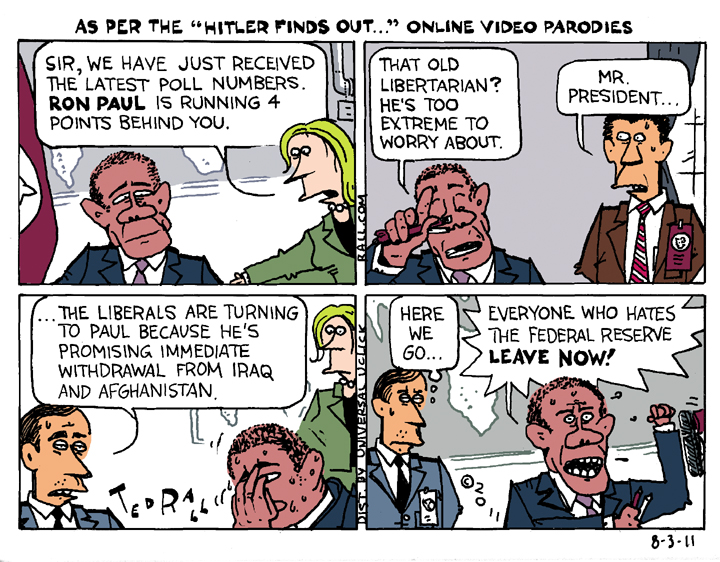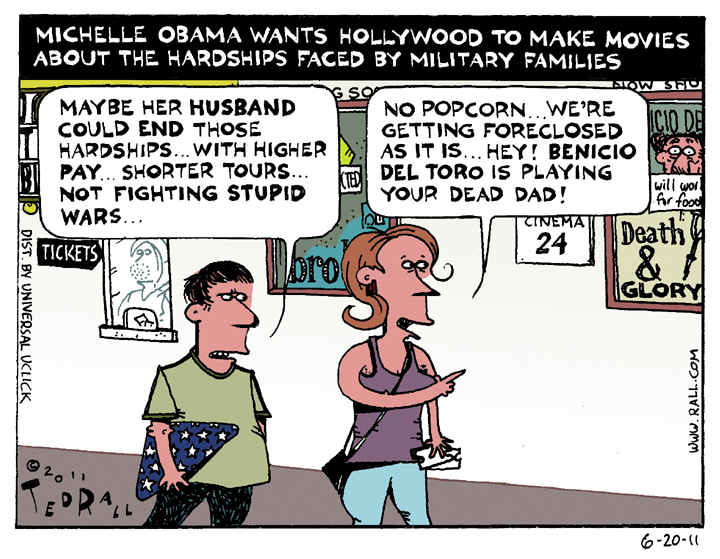The Left’s Case for Boycotting Obama in November 2012
Three years in, it’s obvious to all but the most willfully obtuse liberals and progressives that their 2008 votes for Obama have not paid off.
The president blames obstructionist Republicans for his lack of action on, well, everything. His blame-the-GOP argument would be plausible if not for one thing: Before the Republicans swept the 2010 midterms, Obama had enormous political capital, a supportive media and Democratic control of both houses of Congress.
Had Obama wanted, he could have governed to the left. Far to the left. To the left of FDR.
Remember how scared we were? The economy was in freefall. We lost 600,000 jobs the month he took office. We would have gone along with anything he asked for, including a new WPA program and permanent jobless benefits.
He didn’t ask.
Obama didn’t govern like a liberal because he didn’t want to. He didn’t want to because he’s not a liberal.
Many progressives are angry. They want to send Obama and his fellow phony Democrats a message next November. But they don’t know how to counter the central argument of the two-party trap.
It goes like this:
“Voting for Obama sucks. He’s just going to do more stuff I hate, like bailing out banksters and starting more wars while ignoring the terrible economy. But what else can I do? I can’t vote for some science-denying, Bible-thumping Republican ignoramus who’d be even worse.
“Not voting? That’s almost as bad as voting Republican. With so much at stake, there’s no choice but to hold my nose and vote Democratic.”
This powerful argument has kept liberals in the Democratic fold since 1976, when Jimmy Carter pushed the party to the right with his huge defense build-up.
Fear of a GOP nation drove them to vote for Bill Clinton, even though his major accomplishments—welfare reform, NAFTA and the WTO—were right-wing.
There’s always something at stake. Every election is “one of the most important elections of our lifetimes.” As a result, there hasn’t been a liberal presidential nominee for 40 years. Mainly, this is because liberal voters are willing to vote for right-wing Democrats.
A lot of liberals, feeling even more conned than usual, are asking me how to counter the two-party trap argument.
Here’s what I tell them:
First and foremost, your vote (or lack thereof) cannot and will not put Rick Perry or Mitt Romney or Sarah Palin in the White House. It’s simple statistics. By definition you can only change one vote: your own. And no state’s electoral votes have ever come down to a single vote.
No election in U.S. history has ever come down to one vote. Not even a local one.
Even in Florida in 2000, the outcome hinged on about 150 ballots. I don’t care how big your family or circle of friends is—you are not going to change 75 or more votes one way or the other. Mathematically speaking, your vote is purely symbolic.
Point two: Democratic Party strategists take liberal voters for granted. Don’t take my word for it; check out books by Washington insiders like former Clinton pollster Dick Morris and “The Political Brain” author Drew Westen. Democratic leaders obsess over “Reagan Democrats,” “soccer moms,” “security moms” or whatever catchphrase equates to “swing voter” during a given year—people who might vote Republican one election, Democratic the next. That’s why “Democrats” run as—and govern like—Republicans.
As for liberals, progressives and leftists, Democrats ask: Where else are they going to go?
Refusing to vote for Obama answers their question: If you don’t stop taking us for granted, we will take our votes elsewhere—whether to the Republicans, a third party, or limbo, boycotting the process altogether.
Point three: Voting for immoral leaders makes you immoral.
It’s one thing to be duped, as liberals were by Carter in 1976. It’s another to knowingly vote for a politician you know or at least strongly suspect will promulgate policies you believe are wrong—which is exactly what most liberals did when they voted for Obama in 2008.
Most Americans and the vast majority of lefties were against the U.S. occupation of Afghanistan. During the campaign Obama pledged to send even more troops there. From a moral standpoint, the blood of every Afghan wounded or killed after January 2009 is on the hands of those of us who pulled a lever, pushed a button or punched a chad for Barack Obama. (That includes me.)
Obama lied about other issues. He promised to close Gitmo, to push for a real healthcare plan (one with a public option), and to withdraw from Iraq. Now, however, we know that he lied.
Knowing what you know now, a vote for Obama in 2012 would be an enthusiastic vote of support for torture, extrajudicial assassinations, drone attacks, corporate healthcare, doing nothing about jobs and staying in Iraq. Your eyes are open. A liberal who votes for Obama would be directly responsible for the torture, the killings, and the suicides of the desperately unemployed.
The two-party trap is the sort of sick game that sadistic concentration camp guards like to play.
“I’m going to shoot this old man or this little boy. You decide which. If you refuse to choose, I’ll shoot both.”
There is only way to deal with ideological terrorists:
Don’t.
Let evil scum do what they like. You can’t stop them anyway. If the guard shoots both the man and the boy, it’s a terrible crime—but the blood is all on his hands.
For a progressive, voting for Obama is like asking the camp guard to shoot one person rather than two. In the short run, it seems like the right decision. In the long run, the man and the boy die—and it’ll partly be your fault,
(Ted Rall is the author of “The Anti-American Manifesto.” His website is tedrall.com.)
COPYRIGHT 2011 TED RALL


